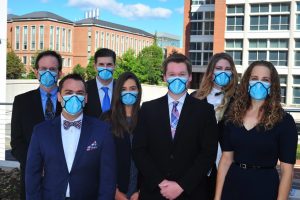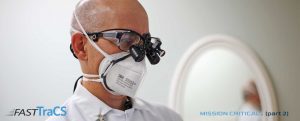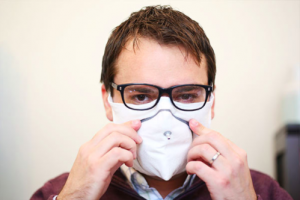A UNC biomedical engineering professor’s knack for entrepreneurial resourcefulness helped him jumpstart the development of an innovative face mask device – and a new startup company.

Innovation is fluid, and the art of tapping into the right resources and support at the right time is crucial, particularly during a pandemic. Devin Hubbard, teaching associate professor in the UNC/NC State Joint Department of Biomedical Engineering (BME) and lead design engineer at the North Carolina Translational and Clinical Sciences Institute (NC TraCS), has perfected the art of using resources offered by UNC-Chapel Hill’s Innovate Carolina network to find quick answers to pressing problems. In response to the increased need for personal protective equipment (PPE) during the COVID-19 pandemic, Hubbard and his team launched Aerem Innovations, a technology company designing solutions for health care and commercial applications. The company is producing the AerFrame, a mask frame device designed to improve the comfort and effectiveness of existing face masks.
If not for his strong, diverse connections across the University’s innovation and entrepreneurship (I&E) network, Hubbard may not have been able to build his company as quickly as he did. He launched Aerem Innovations in July 2020, just a few months after initially exploring his idea for the mask frame in spring 2020.
“Collaboration and access to diverse resources and thinkers is always vital, but it is absolutely necessary… especially when looking to solve a problem that didn’t exist a year ago,” says Hubbard. “The ability to have access to so many diverse resources and connections made this sprint to market possible.”
Connecting across campus to speed innovation
As a professor, researcher and entrepreneur, Hubbard is plugged into the many I&E tools and programs available on campus. When his team was ready to launch Aerem Innovations, his resourceful approach gave him instant access to experts, which led to quick connections and cross-campus collaborations with Innovate Carolina’s KickStart Venture Services and Office of Technology Commercialization teams, Carolina Research Ventures, NC State University Nonwovens Institute, UNC Healthcare, Center for Environmental Medicine and Asthma, the UNC/NC State Joint Department of Biomedical Engineering, and the FastTraCS team at the North Carolina Translational and Clinical Sciences (NC TraCS) Institute.
KickStart Venture Services (KVS), a startup services program and accelerator within UNC-Chapel Hill’s Innovate Carolina office, offers a variety of services to faculty-founded ventures based on intellectual property. These include the coaching, advisement and connections it provides during normal periods to pandemic-specific support like helping companies pivot existing life science technologies toward COVID-19, write grants for COVID-related federal grants and plan for future physical space needs.
“I teach in a very entrepreneurial style, and I like to cultivate the entrepreneurial spirit in my classroom,” says Hubbard. “We definitely took advantage of KickStart’s connections. Through the network, we’ve made a lot of great connections that have helped enable our progress to where we are now.”
Aerem Innovations participated in the Venture Catalyst Program, an initiative from Innovate Carolina and KVS that allows leaders of UNC-affiliated startups, serial entrepreneur coaches and talented graduate students to converge and collaborate. The program includes two connected opportunities. The first is a coaching session module that brings together teams of serial entrepreneur who use pitch-based coaching to provide expert advice, connections and mentorship. The second is a fellows program, which offers educational and experiential learning opportunities to uncover market opportunities and solve business challenges.

When identifying companies to participate in the program, the Venture Catalyst Program team knew Hubbard’s company would be a perfect fit.
“As one of Kickstart’s emerging ventures from 2020, Aerem Innovations was selected for participation in the Venture Catalyst Program given their impressive accelerated commercialization timeframe, along with their mission to support vital public health needs created by the Covid-19 pandemic,” says Judy Prasad, operations and program manager at KickStart Venture Services. “As the company continues to meet critical milestones, we foresee the resources provided by our program as integral to their product development strategy.”
Kickstart helps early-stage companies meet commercial milestones either on the technical side (prototype development, animal studies) or on the business side (regulatory pathway, freedom to operate).
“Through their robust and well-defined application for a KVS grant-award, it was very apparent that Aerem Innovations had identified the key milestones and metrics needed to build and scale their company’s minimal viable product,” adds Prasad.
The UNC Office of Technology Commercialization (OTC) provided support by helping Aerem Innovations gain a Carolina Express license, which streamlines and speeds the path for UNC-Chapel Hill faculty, students or staff startup founders to translate new discoveries into useful products.
“Given the nature of the device that was developed by Devin and his co-inventors, PPE to address the pandemic related N95 mask shortage, there was a sense of urgency to move forward as quickly as possible so this product could address the shortage,” says Matt Howe, a commercialization manager with OTC. “We worked together to quickly protect the intellectual property as well as quickly license the IP through a Carolina Express License so that frame manufacturing could begin. The benefit of a frame like this was clear from the start – addressing N95 mask shortages, while improving the efficiency of cloth and surgical masks that are frequently worn in daily life.”

The new company also worked with the Carolina Research Ventures Program, an early-stage investment fund that helps provide critical discovery and development capital and aims to unlock the potential of UNC technologies and advance the commercialization of these technologies by providing early-stage capital and industry expertise. Hubbard and his team tapped into the deep expertise and connections provided by CRV to advance their business and go-to-market strategy.
Building a team within the Carolina entrepreneurial community
The various innovation support groups and programs that Hubbard worked across campus also helped him to build his company’s team, which is comprised of industry experts as well as Carolina graduate and undergraduate students. The Aerem Innovations team – a small group of eager, talented innovators – was ready to meet the unknown challenges of building the startup during a pandemic, while stepping into leadership roles.
“Entrepreneurship is a really powerful tool to enable leadership diversity, empowering those that may not normally be expected to be leaders in a company,” says Hubbard. “I want everyone on my team to be leaders in the future if they’re not already. It’s important to me that I get a chance to develop that with my team.”
As it turns out, Aerem Innovations is a new venture that’s charting new territory for how Carolina faculty and students work together on building companies.
“This is the first time in the history of the University of North Carolina that a company has been co-founded by a faculty member and an undergraduate at the same department,” says Hubbard. “We take that as a point of pride.”
Ethan Smith, head of research and development for the company, is a third-year undergraduate in BME program and is responsible for the CAD modeling, design iteration and product evaluation at the company.
“It’s been a crazy experience from the beginning, primarily due to life during a pandemic but also because we’re trying to do our part in alleviating some of those adverse effects,” says Smith. “My role in R&D is something I’m pretty familiar with as I’ve been working with CAD for a while now, but the biomedical side is new and an area I’ve wanted to work in. I came to UNC to get more experience in medical-oriented research and projects through the BME department, so this opportunity was a perfect fit. I may be on the younger side for the position I have in our startup, but I’ve felt well prepared from my previous experiences and have expanded my skill set through working with the Aerem Innovations team.”
“I came to UNC to get more experience in medical-oriented research and projects through the BME department, so this opportunity was a perfect fit. I may be on the younger side for the position I have in our startup, but I’ve felt well prepared from my previous experiences and have expanded my skill set through working with the Aerem Innovations team.”Ethan Smith, UNC undergraduate student and head of research development at Aerem Innovations
Co-founder Nicole Wiley, head of regulatory affairs for the company, is also a prototype and design engineer at FastTraCS. FastTraCS is a small group of biomedical engineers within NC TraCS who support UNC Health physicians, nurses and staff by identifying problems in clinical settings and creating innovative, technological solutions.
“I believe we’ve engineered a novel device that will help many people, so there was no hesitation when taking on the role and its responsibilities in order to ensure Aerem Innovations succeeds,” says Wiley. “The team at Aerem is so talented and supportive of one another that success in not just my role but everyone’s role is almost guaranteed.”
Hubbard’s initial work at the beginning of the pandemic through the biomedical engineering department allowed the team many immediate advantages, including product development and rapid feedback on the device designs as well as materials. The department, which is housed jointly at UNC-Chapel Hill and NC State University, has played a significant role in responding to COVID-19.
“One of the huge advantages of having deep connections at NC State is that we can call up anyone over at the College of Textiles, the College of Engineering or the College of Veterinary Medicine,” says Hubbard. “We can leverage resources from both campuses, which puts us in a pretty unique and powerful position.”
Hubbard is passionate about the dual role he plays as entrepreneur and faculty member and encourages other innovators – both faculty and students – to use the network of innovation programs and resources at UNC-Chapel Hill to put their own ideas into motion.
“Being in the entrepreneurial community offers a very unique opportunity for me as an individual who normally works in a classroom setting, to truly practice, demonstrate and work to make innovation happen,” says Hubbard. “At the end of the day, what’s most exciting to me personally is the ability to grow a team and grow people’s skills so that I can help ready the next generation or help somebody get where they want to go.”
The company started mass production at the beginning of the year and product will be ready to ship by next week. Aerem is accepting volume orders via its website for companies, healthcare systems, universities and researchers and is in the process of setting up an ordering system for individuals and small businesses. For more information, visit their website.
